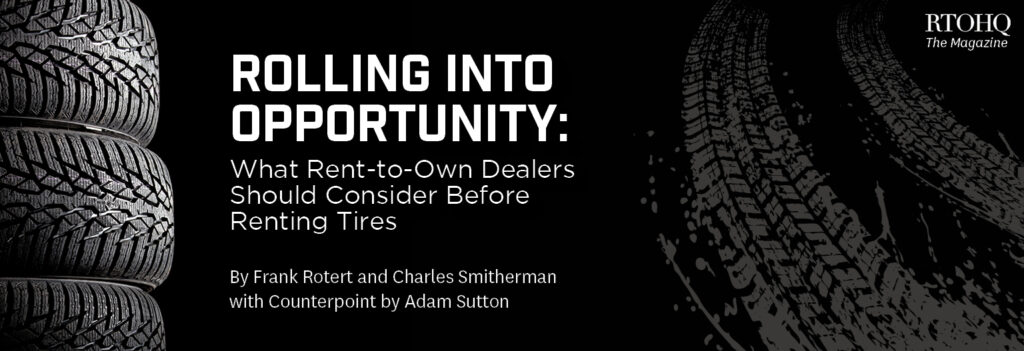
What Rent-to-Own Dealers Should Consider Before Renting Tires
In the rent-to-own (RTO) industry, success depends on anticipating customer needs and offering products that balance value, necessity, and demand. One product category that checks all those boxes – and yet remains underutilized – is tires.
For RTO dealers looking to grow their business with a recurring, high-utility product, renting tires is a smart, scalable opportunity. From safety to sales, customer loyalty to long-term value, tires are a practical item that every car driver needs – over and over again.
WHY TIRES MATTER: MEETING A BASIC NEED
Tires keep people moving – to work, to school, to doctor’s appointments, and back home safely. Like many RTO products that enhance daily life, tires are essential as well. Beyond a fundamental need to operate a vehicle, tires are a critical safety component. When a customer’s tires wear out, they need to be replaced – not someday, but now.
The average driver logs almost 15,000 miles a year. With a tire lifespan around 45,000 to 50,000 miles, that means a replacement every 2 to 3 years – more frequently and with a shorter lifespan than nearly any other product in a typical RTO showroom.
There are approximately 280 million registered vehicles in the U. S., and nearly 300 million tires are sold annually – a number that grows 3-5% each year. That demand is steady, repeatable, and recession-resistant.
WHY SELL TIRES? THE BUSINESS CASE
The short lifecycle and essential nature of tires make them an ideal RTO product:
- Recurring demand: Since customers will need new tires every few years, tires provide built-in repeat business.
- Increased ticket value: Tires drive up the average sale, and lead to add-on vehicle services.
- Minimal risk: Once installed, tires are rarely returned – and if a customer falls behind, tires often take priority given their essential need for transportation.
PRO TIP: Apply payments to tires first. Protect what customers value most – their mobility.
SELLING TIRES EFFECTIVELY
You don’t need to reinvent your business model to sell tires. Many RTO strategies already in use work for this product category too:
- Designate a tire station in your store with a desk, computer, and tire display.
- Use guerilla marketing: Place the “Old and Bald” business card with a QR code on the driver side window that directs them to the store website and generates traffic.
- Promote the safety angle: Offer free tire safety checks using a tire depth gauge. Teach staff to walk customers to their car after payment to assess their tires and start a conversation.
PRO TIP: Give every staff member a tire depth gauge to wear on a lanyard. This small tool can lead to big conversations.
EDUCATING CUSTOMERS: SAFETY FIRST
One of the most powerful selling angles is education. Many drivers don’t realize their tires are unsafe until it’s too late. Use facts to your advantage:
- Tread depth affects braking distance: The National Safety Council (NSC) notes that bald tires can take the length of a football field to stop at highway speeds.
- Tire age matters: Look for the DOT code (e.g., 1422 means the 14th week of 2022). Most tires expire after six years, even if unused.
- Reading tire specs: It’s not that difficult – see the miniguide below for all the details!
PRO TIP: Make it real for the customer: driving on bald tires can invalidate insurance claims. Helping them stay legal and safe isn’t just good service – it’s smart business and a valuable way to serve your customers.
TIRE SALES SUPPORT
Tires aren’t just about the rubber. Smart selling includes:
- Selling in pairs or sets of four: This ensures balanced wear and safer handling.
- Road hazard protection programs: Offer peace of mind and increase customer confidence.
- Alignment services: Sell them before installing tires for best performance and longevity.
PRO TIP: Include the NSC stopping distance chart in your marketing. Nothing drives home tire safety like a football field-long stopping distance.
FINDING THE RIGHT INSTALLER PARTNERS
Installation logistics scare some dealers off – but with the right partners, it’s seamless. The key is to go local:
- Skip the big box stores: They often view RTO operations as competitors or can’t adapt to your needs.
- Find decision-makers: Call local shops, ask when the owner’s in, and have a face-to-face conversation.
- Make your pitch: “I have multiple sets of tires to install every month. I want to send you business and pay you for installs.”
Most shops will say yes – especially when you offer volume and payment.
And there’s more upside for your installer partners:
- Cross-selling opportunities: One in every three tire installs leads to upsells such as oil changes, headlight fixes, etc.
- Foot traffic: Your referrals become their customers, often for life.
One smart strategy? Ask shops how they advertise, then explain you’ll bring them customers consistently without cost.
PRO TIP: Let shops know the tire sale is already made. They just need to install – and maybe pick up a few new customers from your friendly RTO store along the way.
UNDERSTANDING THE NUMBERS AND CODES ON A TIRE
When talking to customers – or training your staff – it helps to know what those numbers on the tire sidewall actually mean.
Here’s a quick breakdown: P205/55 R16
P: Personal Vehicle
205: Width of the tire is 205 millimeters
55: Aspect ratio (height of the sidewall as a percentage of the width) is 55
R: Radial tire
16: Rim size is 16
DOT Code – Example: DOT 1422
• Indicates the tire was manufactured in the 14th week of 2022
• Tires expire after 6 years, even if they’ve never been used
PRO TIP: It’s easy to find the recommended tire size by opening the driver’s side door – about 95% of vehicles list the tire size on the door jamb sticker. If it’s not there, then check the glove box!
SOURCING AND DISTRIBUTION: PICKING THE RIGHT TIRE DISTRIBUTOR
To succeed, you need a reliable, responsive tire supplier or distributor. Distributor benefits that stand out and offer excellent value include:
- Dealer-level pricing once you’re signed up
- 24-hour delivery to your store (depending on your location)
- Inventory flexibility: Get what you need, when you need it. No need to stock tire inventory – your supplier does that for you.
Check distributor maps and build relationships with reps in your area. Big box stores are the supplier of last resort.
Once the tires arrive, your team contacts the customer and installer. In most cases, the job gets done in just a day or two – no storage, no delays.
Dealers also benefit from supplier reps with industry insight. Local shops stand to benefit from installing customer- sourced tires: the online tire market is here to stay, and local installers should adapt rather than resist.
That mindset shift opens the door for partnerships and efficiency. Tires don’t have to be complicated – they just require a good system and great partners
For rent-to-own dealers exploring ways to diversify their product mix, tires and wheels present an option worth evaluating. The demand is well-established, the customer need is ongoing, and early adopters have reported promising results. But like any product line, success depends on thoughtful implementation, strong supplier relationships, and staff engagement.
Tires may not be the right fit for every store or market. Dealers need to weigh logistics, installation partnerships, and inventory management alongside the potential benefits. However, for those looking to add essential, repeat-use items to their inventory – particularly products that support customer safety and vehicle reliability – tires offer a compelling case for consideration.
As with any business decision, taking the time to understand the market, build the right systems, and train your team will be key. If done well, tires could complement your existing offerings while helping your customers meet a critical everyday need.
And remember, you don’t have to reinvent the wheel – reach out to fellow RTO dealers who already offer tires to benefit from their experience. When we were evaluating whether to add tires to our business back in the fall of 2018, we visited with Mike Tissot. With the knowledge we learned from him, we were able to find installation partners for each store, secure a tire distributor, and train staff in a very short time to launch our program in January of 2019. We have now rented approximately 12,000 tires since that time.
It’s not about following a trend – it’s about evaluating what makes sense for your business, your team, and your community. Tires and wheels may be a smart addition, or simply a new idea to keep on the radar for future growth.
QUESTIONS TO ASK BEFORE RENTING TIRES
Consider these points before adding tires and wheels to your RTO offerings:
- Do you have a local installation partner? Can you build a relationship with a nearby shop to handle tire installs?
- Are you prepared to educate staff and customers on tire safety? Understanding tire wear, DOT codes, and size specs builds credibility.
- Can you offer road hazard coverage? Value-added services help customers feel more secure and increase keep rates.
- What marketing methods can you use to promote tires? From direct mail to tire cards on car door handles, what fits your store culture?
COUNTERPOINT FROM ADAM SUTTON, CEO, RNR TIRE EXPRESS: A FEW ADDITIONAL THOUGHTS & CONCERNS FOR CONSIDERATION
I offer this counterpoint with a deep love and passion for the Rent-To-Own industry, its customers and APRO -this comes from someone who grew up in its halls as the son of Larry Sutton, “The Reverend of RTO.” As the CEO of an RTO Tire and Wheel company, I am grateful APRO asked me to offer my opinion and share a few additional considerations regarding tire sales and installation before, or when, selling tires. Please understand these cautions are not shared as an attempt to avoid competition in this product area; rather, these additional thoughts and tips are offered to ensure your business, your team members and customers are valued and protected.
I agree with much of the content in this article, but my overall opinion would advise against traditional RTO dealers choosing to add tires to their core model until you’ve considered all the risks and rewards, thoroughly. Unlike furniture and appliances, tires come with safety and liability issues that most RTO operators have not previously navigated. Tires introduce a layer of operational knowledge and complexity that may be outside the core functions and comfort zone of the typical brick and mortar RTO business. Ordering the right tires for the right vehicles involves its own challenges, e.g., size, speed rating and load capacity, especially if a vehicle has been or is going to be modified from the original OEM specs. Another key consideration is the maintenance throughout the life of the tire, e.g., rotate and balance, flat repair, alignments, and blowouts to name a few. An untrained team may introduce disproportionate legal or logistical risks and headaches to your business.
Dealers might also consider whether tires are generating meaningful new revenue or simply trading rental dollars away from high-margin, low-risk items to low-margin, high-risk products that require a significant sales volume to be successful. For example, a customer opting to rent a set of tires in your showroom might be the same customer who would have otherwise rented a gaming system, appliances, or furniture pieces — products that are easier to control and re-possess (if needed).
I’d like to offer a couple of specific “pro-tips” for your consideration when choosing to enter into a relationship with a local installer:
PRO TIP #1: Confirm the installer has proper liability insurance (with written indemnification for you of any liability). Traditional RTO operators have built their businesses on trust — offering products that they know, can repair or replace easily and that do not typically put your customers in harm’s way. Tires are a different business entirely — one that comes with liabilities that must be fully controlled.
PRO TIP #2: Ensure the installer will respect and care for your customers in the short term and over the long run and that they will continually employ properly certified and trained technicians.
In summary: Traditional RTO dealers choosing to add tires to their core model must consider the consequences of a product that potentially brings significant damage and risk to your brand’s image and bottom line and the potential impact on your long-term customer relationships. I’m not saying it can’t be done, just suggesting that ultimately, you must ask yourself if the risk is worth the potential reward. I welcome your feedback and questions.
BONUS PRO TIP: If you truly want to Rent-To-Own tires the best and safest way, I suggest reaching out to one of the several RTO Tire/Wheel Franchises directly. I’ve heard great things about RNR Tire Express…
Frank Rotert is VP of Operations at Ace Rent-to-Own, Charles Smitherman is CEO of APRO, and Adam Sutton is CEO at RNR Tire Express.









